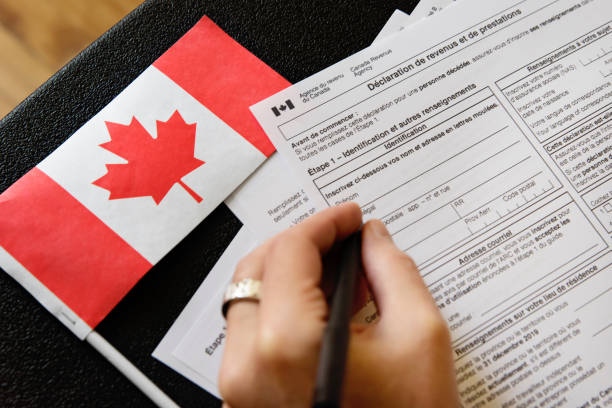Understanding Canadian Taxes for New Immigrants: A Beginner’s Guide to Filing Your First Return
Starting your new life in Canada comes with a few essential responsibilities, and understanding the tax system is one of them. As a new immigrant, filing your first tax return might feel unfamiliar, but it’s essential to your financial journey. Canada’s tax system funds critical services like healthcare, education, and public safety, so knowing how it works and how to file your taxes correctly is necessary.
In this guide, we’ll break down everything you need to know about filing your first tax return as a newcomer to Canada. You’ll learn about the Canadian tax system, who needs to file, and what forms and documents you’ll need to make the process easier. Let’s start and make your first tax season in Canada simple and stress-free!
Read: Financial Planning for New Immigrants to Canada: How to Manage Your Money and Build Wealth
How the Canadian Tax System Works
The Canadian tax system helps fund the country’s essential services, and it’s important to understand how it works before you file your first return.

- Income Taxes in Canada:
- Income tax is calculated based on the money you earn during the year.
- The system is progressive, meaning the more you earn, the higher your tax rate.
- Taxes fund critical services like healthcare, education, and infrastructure.
- Provincial and Federal Taxes:
- The federal government collects taxes that apply across Canada.
- Each province or territory also collects taxes depending on where you live.
- Provincial taxes support local services, while federal taxes fund nationwide programs.
- Residency Status and Taxes:
- Your tax obligations depend on whether you are considered a tax resident of Canada.
- Tax residency is based on where you live and have significant ties, like a home or job.
- Even if you’re not a permanent resident, if Canada is your primary residence for the year, you may need to file taxes.
Who Needs to File a Tax Return?
Filing a tax return in Canada ensures you meet your obligations and access potential benefits and credits. Here’s who needs to file:
- Newcomers to Canada:
- If you moved to Canada during the tax year, you’ll need to file a return for the portion of the year you were a resident.
- Report all worldwide income earned in Canada, even from another country.
- Filing a return may allow you to claim benefits such as the GST/HST credit or Canada Child Benefit (if applicable).
- Tax Obligations for Different Statuses:
- Depending on their income, permanent residents, work permit holders, and international students may all need to file.
- Even with temporary status, you must file taxes if you earned income in Canada or meet the residency criteria.
- Foreign income must also be reported if you are a Canadian tax resident.
- Income Thresholds:
- If your income exceeds the basic personal amount (approximately $15,000, though it varies by year), you must file a tax return.
- Even if your income is below this threshold, filing is still recommended to claim refunds or credits you may be eligible for.
Read: Canada Express Entry System: A step-by-step guide
Understanding Canadian Tax Forms and Documents
Having the proper forms and documents ready is essential to filing your taxes correctly. Here’s what you’ll need:

- SIN (Social Insurance Number):
- A SIN is required to work in Canada and file your taxes.
- If you don’t have a SIN, apply for one as soon as possible through Service Canada.
- Your SIN is necessary to report income and access social programs like Employment Insurance (EI) and the Canada Pension Plan (CPP).
- T1 General Tax Form:
- The T1 General is the main form to report your income, deductions, and tax credits.
- It includes information about your income, taxes paid, and any refunds or payments owed.
- You can complete this form by hand, using tax software, or with the help of a tax professional.
- Important Tax Slips (T4, T5, T4A):
- T4 slip: Provided by your employer, this slip shows your total earnings and the amount of tax deducted.
- T5 slip: Issued for investment income, such as interest or dividends
- T4A slip: Covers other types of income, including scholarships, self-employment income, or pensions.
- Supporting Documents:
- Keep receipts for deductible expenses like medical costs, charitable donations, or moving expenses.
- Certain credits, such as the Canada Caregiver Credit or tuition tax credit, require specific documentation.
- Always keep your records for at least six years in case of an audit by the CRA.
Step-by-Step Guide to Filing Your First Tax Return
As a newcomer, filing your first tax return in Canada might feel overwhelming, but you can make it easy with these steps.

Determine Your Residency Status
Your tax obligations depend on your residency status. If you have significant ties to Canada (such as a home or job), you’ll likely be considered a tax resident and must report your worldwide income.
Collect Your Income Information
Gather all relevant documents showing your earnings. These include T4 slips from employers, investment income slips (T5), or other income like pensions or scholarships (T4A). Make sure you have everything ready before you start.
Download or Use Tax Software
You can file your return using tax software like TurboTax or Wealthsimple, which is user-friendly and guides you step-by-step. Many of these platforms are available for free or at a low cost.
Claim Applicable Deductions and Credits
You may qualify for several deductions and credits, such as:
- Moving Expenses: If you moved to Canada for work or studies, you may be able to deduct some moving costs.
- GST/HST Credit: A tax-free quarterly payment to help offset the sales taxes you pay.
- Tuition Credits: If you paid for post-secondary education, claim the tax credit.
- Canada Child Benefit (CCB): A tax-free monthly payment to eligible families with children under 18.
Submit Your Return to the CRA
Once you’ve completed your tax return, you can submit it online using CRA’s NETFILE service, by mail, or through a tax preparer. Filing online is the fastest and easiest method.
Monitor Your Notice of Assessment
After submitting your return, you will receive a Notice of Assessment (NOA) from the CRA. This document summarizes your tax return, shows any balance owed or refunds, and includes any corrections the CRA may have made.
Read: How You Can Succeed On LinkedIn In Canada
Standard Deductions and Tax Credits for New Immigrants
As a newcomer, several deductions and credits can help lower your tax burden:
- Canada Child Benefit (CCB):
- A tax-free monthly payment for families to help cover raising children’s costs.
- Eligibility depends on factors such as your family income, the number of children, and their ages.
- Payments can increase for lower-income families and decrease as income rises.
- GST/HST Credit:
- A quarterly tax-free payment to offset the cost of goods and services taxes for low- and middle-income individuals and families.
- Your income, marital status, and family size determine eligibility.
- Payments can range based on these factors, providing financial relief to those who qualify.
- Medical Expenses:
- You can claim qualifying medical expenses that exceed the lesser of 3% of your net income or a set threshold.
- Eligible expenses include prescription medication, dental care, and specific medical devices.
- You’ll need to keep receipts and records to support your claim.
- Moving Expenses:
- If you move to Canada for a job or education, you can claim certain moving-related costs.
- Eligible expenses include transportation, storage, and temporary housing costs.
- Your move must meet specific distance and purpose criteria for the deduction.
- Tuition Credits:
- You can claim tuition fees paid to eligible institutions to reduce your tax payable.
- This credit can be used to lower taxes owed and, if not fully used, carried over to future years.
- Ensure you receive a T2202 slip from your educational institution to claim this credit.
- RRSP Contributions:
- Contributions to a Registered Retirement Savings Plan (RRSP) reduce your taxable income, helping you save for retirement.
- The more you contribute (up to your contribution limit), the lower your taxable income will be.
- Contributions can be made anytime up to 60 days after the end of the tax year to claim for that year.
Important Deadlines and Penalties
To avoid unnecessary penalties, it’s crucial to meet tax deadlines:
- Filing Deadline:
- Most Canadians must file their tax return by April 30 for the previous tax year.
- The filing deadline for self-employed individuals is June 15, but to avoid interest charges, any taxes owed must be paid by April 30.
- Make sure to gather all relevant documents and slips to meet these deadlines.
- Late Filing Penalties:
- If you miss the filing deadline, the penalty is generally 5% of the unpaid tax amount, plus an additional 1% for each month the return is late, up to 12 months.
- Continued failure to file may result in additional penalties or even legal action by the Canada Revenue Agency (CRA).
- Filing even if you can’t pay the total amount is advisable to avoid these penalties.
- Installment Payments for Self-Employed Individuals:
- You must make quarterly installments if you expect to owe more than $3,000 in taxes.
- Installment payments are due in March, June, September, and December.
- Missing payments could result in interest charges, so staying on schedule is crucial.
Tax Resources for Newcomers
If you need help filing your return, these resources are helpful:
- CRA Newcomer’s Guide: The Canada Revenue Agency offers a guide specifically for newcomers to help them understand their tax obligations.
- Free Tax Clinics: The CRA’s Community Volunteer Income Tax Program (CVITP) provides free tax help for newcomers with simple tax situations and low income.
- Online Tax Software: Many tax software options are available, including free and paid versions of TurboTax, SimpleTax, and Wealthsimple.
When to Hire a Tax Professional
Some situations may require expert help:
- Complex Situations: If you have complex income sources, such as foreign income, rental properties, or investments, it might be wise to hire a tax professional to ensure accuracy.
- Certified Tax Preparers: Look for a certified tax preparer with experience helping newcomers to ensure you get the right advice.
- Tax Preparation Fees: The cost of hiring a tax professional can vary, usually from $50 to $300, depending on the complexity of your return.
Filing your first tax return in Canada as a newcomer can be simple. You can confidently complete your return by following the steps in this guide. If you need help, free tax clinics or professional tax preparers are available. Start filing today to avoid penalties and ensure you get any refunds or benefits you’re entitled to.

I want to go to Canada for work
hello